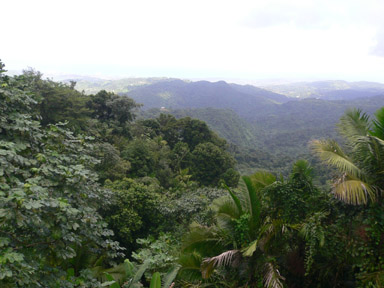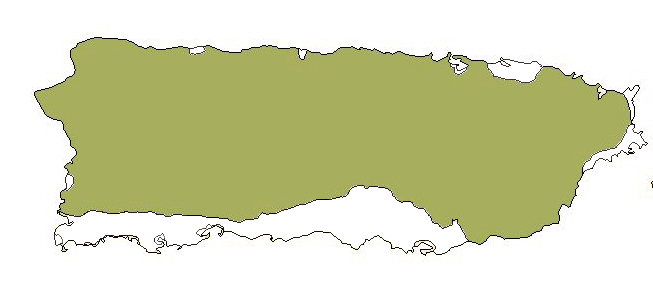
El Yunque rainforest, Caribbean National Forest, Puerto Rico. (c) 2006 Steven Klipowicz
Bioimages home (click on an image to enlarge)
view
this page in its intended navigation context
Puerto Rican moist forests
(WWF
ecoregion NT0155)

El Yunque rainforest, Caribbean National
Forest, Puerto Rico.
(c) 2006 Steven
Klipowicz

Source of ecoregions data:
Olson, D. M. and
E. Dinerstein. The Global 200: Priority ecoregions for global conservation. (PDF
file) Annals of the Missouri Botanical Garden 89:125-126.
Distinctiveness (1=highest,4=lowest): (not
assessed)
A wide variety of species occur in habitats which vary due to elevation.*
Conservation Status (1=most endangered, 5=most
intact): 2 (endangered)
Development threatens this ecoregion outside of protected areas.
 Prestoea
montana (sierra
palm)
(c) 2006 Steven
Klipowicz
hires
Prestoea
montana (sierra
palm)
(c) 2006 Steven
Klipowicz
hiresAssociated habitats


 (c) 2006 Steven
Klipowicz
hires
hires
hires
(c) 2006 Steven
Klipowicz
hires
hires
hires
El Yunque forest, Caribbean Ntl. Forest, Puerto Rico


The forest grows primarily over the hills and valleys of the Loquillo Mountains.
On the steeper slopes, landslides are common (right). left:
(c) 2006 Steven
Klipowicz
hires,
right:
(c) 2006 Emma
Hamilton
hires


El Yunque is divided into several forest types based on elevation. At the
higher elevations, rainfall can be heavy, resulting in lush rain forests and
waterfalls.
(c) 2006 Steven
Klipowicz
hires
hires


In the dense forest, competition for light in the canopy is intense. Gaps
caused by treefalls or other disturbances provide an opportunity for the
establishment of new individuals.
left:
(c) 2006 Steven
Klipowicz
hires,
right:
(c) 2006 Emma
Hamilton
hires


A common growth form in the forest is the liana, woody vines that use trees to
support their growth into the increased light available in the canopy.
(c) 2006 Steven
Klipowicz
hires
hires


Giant tree ferns are an important component of the forest.
(c) 2006 Steven
Klipowicz
hires
hires


An important forest type in El Yunque is the Sierra palm forest, located at
elevations above 500 m.
(c) 2006 Steven
Klipowicz
hires
hires



The palms have distinctive roots that grow out of the base of the trunk
(center). The fruits of the palms form an important part of the diet of
the endangered Puerto Rican parrot (fruit cluster can be seen on a tree in the
right image).
(c) 2006 Steven
Klipowicz
hires
hires
hires
* Ricketts, T.H., E. Dinerstein, D.M. Olson, C.J. Loucks, et al. (1999) Terrestrial Ecoregions of North America: A Conservation Assessment. World Wildlife Fund - United States and Canada. Island Press, Washington, D.C. pp. 150-152.